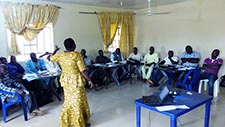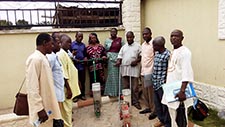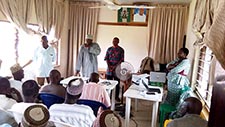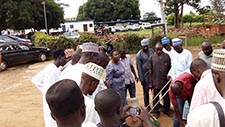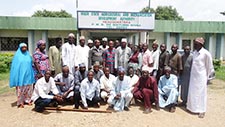Best agronomic practices and M&E tools
A series of training was conducted for Extension Agents (EAs) and partners’ staff of Niger State Agricultural and Mechanization Authority (NAMDA) and USAID-MARKETS II in Niger, Kaduna, Benue and Kano states during the 2016 planting season. Such trainings were also attended by the respective partners targeting the needs of farmers and other collaborators in the legume value chain. The training was specifically designed to raise the capacity of N2Africa partners in view of the responsibility and high expectations on delivery as contained in the partnership document. More so, some partners had engaged new faces (EAs) and other adhoc staff for the routine task of implementing the different activities in the collaboration. Therefore, creating awareness and boosting the capacity of staff in the field, especially with regards to application of N2Africa data collection tools, ranging from field agronomy (demo, adaptation, focal adaptation and diagnostic trials) and M&E tools became important and timely. It is noteworthy of mentioning that these trainings were also replicated by other N2Africa partners, such as CRS and IFDC.
|
A cross section of the participants with the Managing Director Seraph Oil Mills |
A training session with Madam Esther Chinedu facilitating |
Outside demonstration of planters to the extension agents |
In this kind of forum, there was an interactive session between participants and training facilitators on one hand and among participants themselves. Different topics in agronomy, M&E tools, as well as other sundry issues related to N2Africa activities and the expected outcomes were clearly elucidated and responses obtained during evaluation. Also, N2Africa data collection documents such as Field Books for demonstration, focal adaptation, input distribution/ feedback adaptation forms, field days, media events and technology evaluation tools were effectively put into use and articulated.
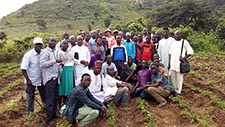 |
Left: Group photograph with the participants and farmers from Shishimpe community near Mpape in Bwari LGA, Abuja Nigeria Right: Dr. Joost Heerwaarden during field inspection and ICT training with Extension Agents and project staff at Shishimpe community near Mpape in Bwari LGA, Abuja Nigeria |
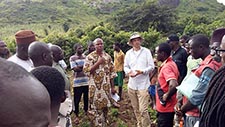 |
In the end, new lessons were learnt, additional knowledge was gained through learning, a better understanding of project activities and implementation was obtained, timeline for carrying out certain activities and expected report(s) was mutually set and agreed upon and effective channels of communication were established. All with the intentions of consolidating and enhancing a robust delivery on activities and achieving greater success in the task ahead. To achieve all these, the EAs, partner’s staff and other concerns were trained. N2Africa staff were the main facilitators; however, partner’s staff of NAMDA, MARKETS II, EGALF and SASAKAWA Global 2000 made good contributions and also assisted strongly in some of the logistics.
|
Interactive session with participants during the training |
Demonstration of planters to Extension Agents |
A cross section of the participants with the Managing Director NAMDA |
Participants’ feedback and conclusion
In all the locations where the training was conducted, the participants exhibited a good sense of discipline and made themselves available to learn. N2Africa tools either from agronomy or M&E were extensively used to enhance application in their respective communities. Learning atmosphere was generally conducive and as such, participation was not a serious challenge. However, some of the trainees need a regular follow up to sift level of accomplishment, compliance and attainment of targets. The onus therefore lies on both the project and partners to evolve a common strategy for effective and timely implementation of mutually agreed activities notwithstanding whether such activities are labeled either as N2Africa direct or joint implementable activity.
In view of this, cohesion, understanding, mutual trust and sacrifices would be required to attain and or surpass the expected targets and much more, in the interest of the resource-poor small holder farmers in Nigeria who are genuinely committed to sustainable food production.
Bassey Ukem, Research Associate, Nigeria


